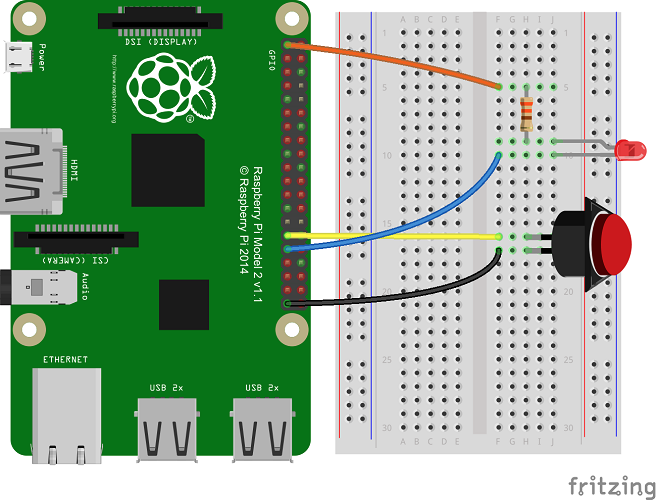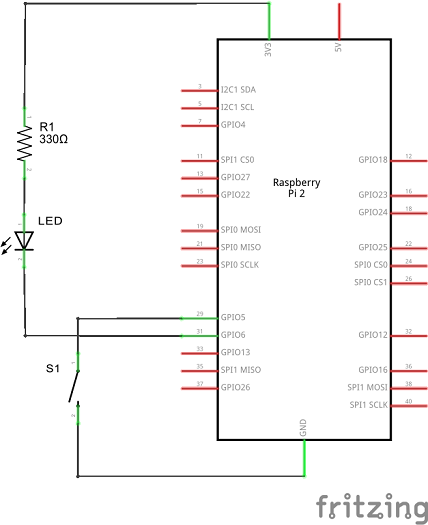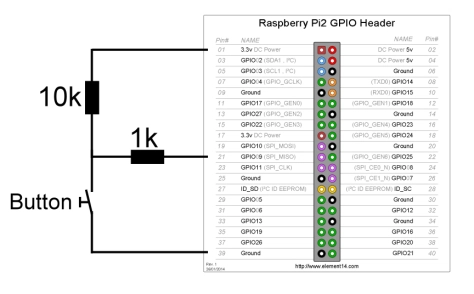Read the statement by Michael Teeuw here.
Button
-
And to complement @KirAsh4 comment: probably the cause is some voltage / EMI feedback, likely due to the wires and switches.
From what I see, the Pi does not have protective diodes on the inputs like the AVR chips (and Arduino) do. As a result, feedback to the Pi can probably cause the behaviour which you experienced. Try to switch on/off some lights and electrical devices and see the result.
To correct this condition, use a combination of current limiting, filtering and shielding.
You could use for current limiting, a 1K resistor in line with the switch, installed on a PCB inches from the Pi. Also use a low-pass filter made up of another pull-up / pull-down resistor and a capacitor alternatively to the build in PULL-UP and PULL-DOWN resistors of the PI.
Here are some additional links:
https://www.raspberrypi.org/forums/viewtopic.php?t=53548
http://www.digikey.com/en/articles/techzone/2012/apr/protecting-inputs-in-digital-electronics
-
Both, thank you for your answer. I will try to give you more informations. The following button from Ebay are used:
Art-Nr. 041
At first, I tryed the configuration from PtrBld´s howto:


https://developer.microsoft.com/de-de/windows/iot/win10/samples/PushButton.htm
After the false positiv pressed buttons, I tryed the actually config:
 https://dracarysdiy.files.wordpress.com/2016/03/button.jpg?w=474
https://dracarysdiy.files.wordpress.com/2016/03/button.jpg?w=474But the problem is always the same.
@CGabo, I will have a look to your links tomorrow. But I am not an electrican, so I hope to understand.
Thank you in advance!
-
Yeah, that’s a floating button. You need a pull-down on it, a known state, so the rpi can detect a change. You can either do that in software with RPi.GPIO and configuring it as such:
GPIO.setup(PIN, GPIO.IN, pull_up_down=GPIO.PUD_DOWN)Or through hardware:
https://www.cl.cam.ac.uk/projects/raspberrypi/tutorials/robot/buttons_and_switches/ -
Okay, now I have a script button.py which starts with rc.local after boot.
import RPi.GPIO as GPIO import time GPIO.setmode(GPIO.BCM) GPIO.setup(9, GPIO.IN, pull_up_down=GPIO.PUD_DOWN) GPIO.cleanup() # clean up GPIO on normal exitBut it´s also not working. Did I miss something?
-
Different permissions. Your
rc.localruns with system privileges, however the MM² task runs as thepiuser. You need to have those GPIO setting in the script that thepiuser runs. -
Okay thanks, the script now starting as user pi.
Other question, has my button.py script to run in a loop?EDIT: Okay the message “button pressed” are coming when I turn the floor lights on 0o?
-
- Take out that
'GPIO.cleanup()'call that you have. That resets everything you just did above it. - Button getting triggered because you turning on the floor (?) lights is because that button is still floating, see #1 above.
- I’m assuming the rpi isn’t on the same circuit as the floor (??) lights, a voltage difference could also falsely trigger the button.
- Take out that
-
Yes it seems it is on the same circuit. The button is pressed when the light goes on and when the light goes off… :D unbelievable
-
So your rpi is then experiencing a dip in voltage, which is coming from whatever you have it connected to, I presume a wall adapter. What’s the output of that adapter? What’s the Amp rating on it? Is it a regulated or unregulated? The latter means with no load, it could very well be supplying ad much as 7-9V, and with a load it drops to 5V, however it also means it will dip rather low if something else comes on on the same circuit. Unfortunately there is no easy way to tell other than to measure its power output.
-
@dicker182
See my previous posting:Probably the cause is some voltage / EMI feedback, likely due to the wires and switches. Try to switch on/off some lights and electrical devices and see the result!
To correct this condition, use a combination of current limiting, filtering and shielding. ;-)Did you read the link?
https://www.raspberrypi.org/forums/viewtopic.php?t=53548Try following:
- Reduce the cable length to the switch.
- Detect either only the rising (GPIO.RISING) or falling event.
- Use bouncetime in ms (minimum time between two callbacks in milliseconds (intermediate events will be ignored))
- Use a capacitor, see folowing example.
http://raspberrypihobbyist.blogspot.ch/2014/11/debouncing-gpio-input.html
